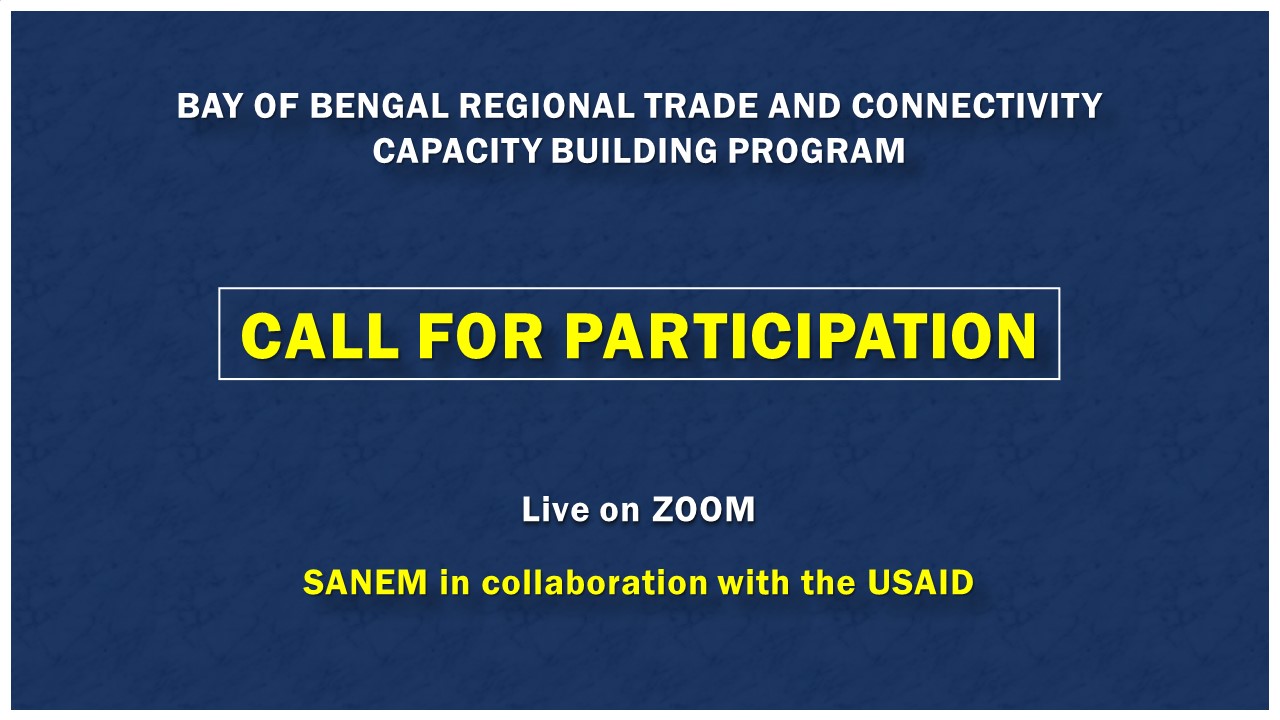Previous Events
Call for Participation
Bay of Bengal Regional Trade and Connectivity Capacity Building Program

South Asian Network on Economic Modeling (SANEM), in collaboration with the USAID and U.S. Department of State-funded Cross-Border Infrastructure and Connectivity project, has launched the “Bay of Bengal Regional Trade and Connectivity Capacity Building Program” for relevant government and non-government stakeholders of the Bay of Bengal region. The program started in October 2021 and will continue till October 2022. The program has 8 modules, among which 4 modules have already been completed. Each module is 2-3 days long. The call for participation in modules 5 to 8 is now open. In this regard, SANEM invites government officials, academics, researchers, officials of business associations, journalists and interested professionals of Bangladesh, Bhutan, India, Nepal, Sri Lanka and Thailand to join the program. Specific programs have been designed for each of the six countries (Bangladesh, Bhutan, Nepal, India, Sri Lanka and Thailand). Modules have been designed in accordance with the specific and focused needs of each of the six countries. However, some of the sessions will include participants from all the six countries. Given the changing global dynamics, a few sessions have been added to make the training more relevant and effective.
The training program aims to develop the participants’ knowledge and awareness of critical issues of trade and connectivity which can then enable them to engage in meaningful dialogue and negotiations with regional partners. It also aims to enhance the analytical and negotiating skills of the participants for effective implementation of trade policy, monitoring, and surveillance.
Coordinated by SANEM and PSE Support, a team of eminent economists is conducting the program. The training is being conducted over the video conferencing app Zoom. No participation fee will be required to join the program. Participants will receive certificates upon completion of the program.
The program is focused on infrastructure connectivity and its role in promoting trade and economic integration within and across countries in the Bay of Bengal region. It will help participants to develop an awareness of trade issues and to identify relevant implications, opportunities, costs, and benefits of deeper regional cooperation in the Bay of Bengal region. Training will be provided to best equip countries of the Bay of Bengal region with the skills needed to undertake specialized trade negotiations. Successful completion of this project will see significant enhancement of skills and capacity of trade officials to understand specific trade and connectivity issues, develop new or refine existing strategies, and have the flexibility to prepare for and negotiate key future trade agreements based on the country’s particular needs. The training outcomes are expected to have cross-cutting impacts on increasing awareness of gender and the disadvantaged communities, eco-sensitivity, and other economic multipliers.
Modules 5 to 8 include sessions on current and global macroeconomic challenges, basic trade tools and methods, WITS SMART model, gravity modeling, partial equilibrium modeling, General Equilibrium modeling, and SWOT analysis to FTA strategies.
Dr Selim Raihan, Professor of Economics, University of Dhaka & Executive Director of SANEM, and Dr Nihal Pitigala, Lead Economist, WBD & InReach Global supervise the program.
To join the program, please fill up the google form: https://forms.gle/qxCTPAK7RLbPkQ8w8
Registered participants will be notified of details via email.
For any queries, please email us at comms.sanem@gmail.com.
South Asian Network on Economic Modeling (SANEM), launched in January 2007 in Dhaka, is a research organization that aims to promote in-depth research in the areas of international trade, macro economy, poverty, labour market, environment, political economy, and economic modeling. It collaborates with government institutions, local and international development partners, and relevant think tanks in various fields of research.
